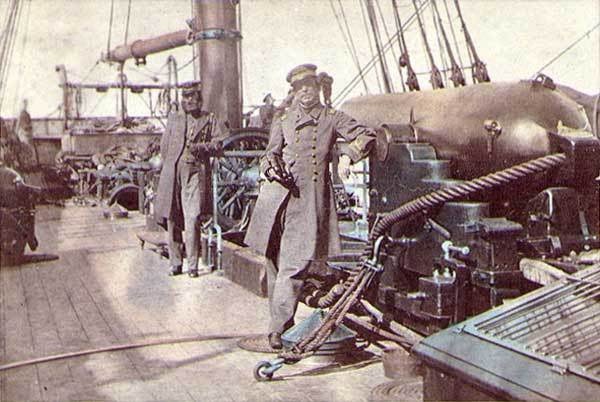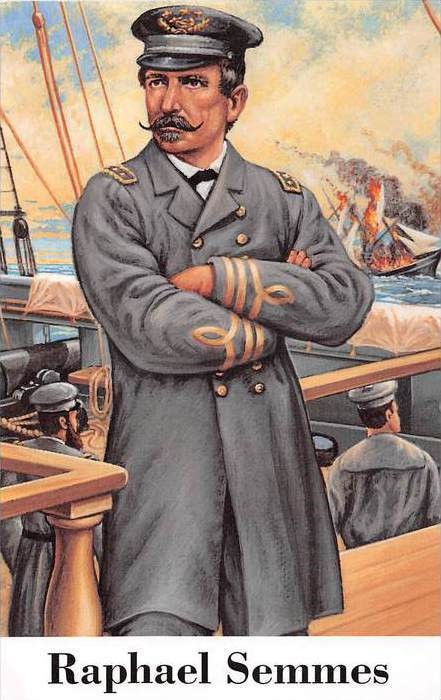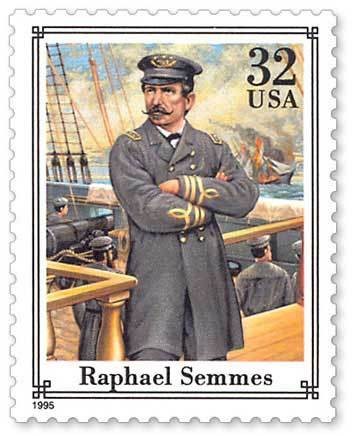Admiral Raphael Semmes Memoirs of Service Afloat
Posted By : manager
Posted : September 10, 2020
Memoirs of Service Afloat During
the War Between the States
by Adm. Raphael Semmes


Publisher’s Note: Adm. Raphael Semmes, famed commander of the legendary Confederate raider, Alabama, wrote a brief, concise and brilliant history of the Articles of Confederation, the establishment of the U. S. Constitution and the right of secession, in the first six chapters of his 833 page book, Memoirs of Service Afloat During the War Between the States. The CSS Alabama took 65 prizes and is the most successful commerce raider in maritime history. Semmes, from Charles County, Maryland was in the U.S. Navy from 1826 to 1861. He fought in the Mexican War as commander of the USS Somers. He served in the Confederate States Navy from 1861 to 1865, first as commander of the raider CSS Sumter, causing 18 losses to the Union, then the CSS Alabama. Alabama was originally the newly built British steamer Enrica. After Alabama’s dazzling career, she was sunk by the USS Kearsarge commanded by John Ancrum Winslow near Cherbourg, France in one of the most famous naval battles of the war, June 19, 1864. Alabama was at a disadvantage because of deteriorated gun powder and shell fuses, and a rare day of poor aim by her gunners. Semmes and survivors made their way back to America and finally Richmond where he commanded the ironclad CSS Virginia II of the James River Squadron. After Richmond fell, he became a temporary brigadier general, informally, and his sailors became an infantry unit known as the “Naval Brigade.” Most of them ended up with Johnston’s army near Durham Station, North Carolina and surrendered to Maj. Gen. William T. Sherman April 26, 1865. After the war, Semmes worked as a college professor at what is today LSU, a judge, a newspaper editor, and author. He died August 30, 1877 at age 67 at Mobile, Alabama and is buried there with his wife Anne E. Spencer Semmes. The town of Semmes, Alabama is named for Raphael Semmes as were several United States Navy ships. Publishing information: Baltimore: Kelly, Piat & Co., 1869. For more information on Raphael Semmes visit the website of the Admiral Raphael Semmes Camp #11, SCV, in Mobile Alabama. Several of the pictures in this post come from their outstanding website.

Chapter I.
A Brief Historical Retrospect
The disruption of the American Union by the war of 1861 was not an unforeseen event. Patrick Henry, and other patriots who struggled against the adoption of the Federal Constitution by the Southern States, foretold it in burning words of prophecy; and when that instrument was adopted, when the great name and great eloquence of James Madison had borne down all opposition, Henry and his compatriots seemed particularly anxious that posterity should be informed of the manly struggle which they had made. Henry said, “The voice of tradition, I trust, will inform posterity of our struggles for freedom. If our descendants be worthy of the name of Americans, they will preserve, and hand down to the latest posterity, the transactions of the present times; and though I confess my explanations are not worth the hearing, they will see I have done my utmost to preserve their liberty.”
The wish of these patriotic men has been gratified. The record of their noble deeds, and all but inspired eloquence, has come down to posterity, and some, at least, of their descendants, “worthy of the name of American,” will accord to them the foremost rank in the long list of patriots and sages who illustrated and adorned our early annals.
But posterity, too, has a history to record and hand down. We, too, have struggled to preserve our liberties, and the liberties of those who are to come after us; and the history of that struggle must not perish. The one struggle is but the complement of the other, and history would be incomplete if either were omitted. Events have vindicated the wisdom of Henry, and those who struggled with him against the adoption of the Federal Constitution. Events will equally vindicate the wisdom of Jefferson Davis, and other Confederate patriots, who endeavored to preserve that Constitution, and hand it down, unimpaired, to their posterity.
The wisdom of a movement is not always to be judged by its success. Principles are eternal, human events are transitory, and it sometimes takes more than one generation or one revolution to establish a principle. At first sight, it may appear that there is some discordance between Patrick Henry and Jefferson Davis, as the one struggled against the adoption of the Constitution, and the other to preserve it. But they were, in fact, both engaged in a similar struggle; the object of both being to preserve the sovereignty of their respective States. Henry did not object so much to the nature of the partnership, into which his State was about to enter, as to the nature of the partners with whom she was about to contract. He saw that the two sections were dissimilar, and that they had different and antagonistic interests, and he was unwilling to trust to the bona fides of the other contracting party. “I am sure,” said he, “that the dangers of this system are real, when those who have no similar interests with the people of this country are to legislate to us — when our dearest interests are to be left in the hands of those whose advantage it will be to infringe them.”
Chapters 3 and 4 of the first 6 of
Memoirs of Service Afloat During
the War Between the States
by Adm. Raphael Semmes

Publisher’s Note: The six chapters of Raphael Semmes’s Memoirs of Service Afloat that I am publishing, two at a time, in these three blog articles, are an OUTSTANDING short constitutional history of our country that is not short on facts or truth. It cuts right to the chase.
ALL SCV, UDC and others should read the six chapters in these three posts but especially the two in this one, Chapters 3 and 4.
With this brilliant argument from one of the greatest naval commanders of all time, who commanded the greatest commerce raider in maritime history, the CSS Alabama, Semmes obliterates the fraudulent argument that secession was treason.
He turns it right back on the ignoramuses by pointing out that the New England States’ Hartford Convention in the War of 1812, while absolutely correct about their right of secession, was unquestionably treasonous because they had demanded that we help their shipping by going to war with the British, then they changed their minds and started giving aid, comfort and support to the British.
Ironically, it was the Southern boys at the Battle of New Orleans under Andrew Jackson that defeated the British and ended that war, thus saving the New England States from dishonoring themselves any further.
The biggest absurdity in all of history is that these same New England traitors fought the War Between the States to free the slaves that they had brought here in the first place, making huge fortunes in the process like the money grubbing Yankees they were.
As with the War of 1812, they encouraged Lincoln to start the War Between the States so that they could continue their theft of Southern money that was going straight into their pockets via the Federal Government’s tariffs, bounties, subsidies, monopolies, etc., proving, incontrovertibly, that the sectionalism and “tyranny of the majority” that had so worried the Founding Fathers, would, indeed, destroy the republic they had created.

Chapter III
From the Foundation of the Federal Government Down to 1830, Both the North and the South Held the Constitution to be a Compact Between the States.
One of the great difficulties in arguing the question of the relative power of the States and of the Federal Government, consists in the fact that the present generation has grown up under the shadow of the great Federal monster, and has been blinded by its giant proportions.
They see around them all the paraphernalia and power of a great government — its splendid capital, its armies, its fleets, its Chief Magistrate, its legislature, and its judiciary — and they find it difficult to realize the fact, that all this grandeur is not self-created, but the offspring of the States.
When our late troubles were culminating, men were heard frequently to exclaim, with plaintive energy, “What! have we no government capable of preserving itself? Is our Government a mere rope of sand, that may be destroyed at the will of the States?”
These men seemed to think that there was but one government to be preserved, and that was the Government of the United States.
Less than a century had elapsed since the adoption of the Constitution, and the generation now on the theatre of events had seemingly forgotten, that the magnificent structure, which they contemplated with so much admiration, was but a creature of the States; that it had been made by them for their convenience, and necessarily held the tenure of its life at sufferance.

They lost sight of the fact that the State governments, who were the creators of the Federal Government, were the governments to be preserved, if there should be any antagonism between them and the Federal Government; and that their services, as well as their sympathies, belonged to the former in preference to the latter.
What with the teachings of Webster and Story, and a host of satellites, the dazzling splendor of the Federal Government, and the overshadowing and corrupting influences of its power, nearly a whole generation in the North had grown up in ignorance of the true nature of the institutions, under which they lived.
This change in the education of the people had taken place since about the year 1830; for, up to that time, both of the great political parties of the country, the Whigs as well as the Democrats, had been States-Rights in doctrine.
Chapters 5 and 6 of the first 6 of
Memoirs of Service Afloat During the War Between the States
by Adm. Raphael Semmes
- Another Brief Historical Retrospect.
- The Question of Slavery, as It Affected Secession.

Publisher’s Note from Gene Kizer, Jr.: The six chapters of Memoirs of Service Afloat During the War Between the States, by Admiral Raphael Semmes, published in this and the two previous blog posts, are the most outstanding, accurate and complete argument on the causes of the War Between the States that I have ever read in a short analysis.
Semmes covers everything and leaves nothing out. He is right about both North and South believing in States Rights until about 1830, which is only 31 years before the war.
What changed was the massive immigration into the North that made them aware of their sectional strength. By 1860, Northerners realized if they could just rally their votes, they could take over the government and have higher tariffs than ever, such as the astronomical Morrill Tariff, as well as more bounties, subsidies, monopolies and any other way they could conceive of to increase their wealth and power.
Even more than the economic issues, the hatred of Southerners used by the Republican Party to rally its votes is what caused the first seven Southern states to secede. Southerners believed in the Declaration of Independence and its statement that the just powers of the government come from the consent of the governed.
There was no consent of the governed in the South in 1860 to be ruled over by crazed, rabid people so full of hate. Sounds like the Democrat Party of today, and there are many parallels that will be written about in coming weeks.
Southerners knew they had the right to secede because New York, Rhode Island and Virginia had all reserved the right of secession, specifically, in writing, before acceding to the Constitution. The acceptance of all the other states of that reserved right of secession of New York, Rhode Island and Virginia, gave it to them as well because all the states entered the Union as equals.
Even after all that Northern hate, 61% of the country still voted against Abraham Lincoln, but that was enough for him to win the electoral college.
Southerners called conventions, which was the precedent set by the Founding Fathers with the Constitution, and they voted to secede from the Union.
They expected peace but got war when Lincoln’s economy without Southern cotton and all those tariffs, bounties, subsidies and monopolies was threatened with annihilation. Lincoln knew he had four times the white population of the South and 100 times the manufacturing so he started his war and 750,000 died and over a million were wounded, but it wasn’t over until the South was destroyed and had nothing else to give.
There is no stain on Southern honor. They were fighting for the republic of sovereign states that the Founding Fathers had envisioned. It was States’ Rights verses a massive, centralized Federal Government (the Yankees were the Federals in the war) that was fighting for Northern control of the country, and certainly not because of a moral desire to end slavery by the same people who had brought all the slaves here and made huge fortunes in the process.
Semmes’s argument is EXACTLY the same argument I make in my book, Slavery Was Not the Cause of the War Between the States, The Irrefutable Argument. It is always good to see one’s historical analysis mirrored and validated by such a towering and brilliant person as Admiral Raphael Semmes.
Our Confederate ancestors are the true heroes of American history. They fought America’s bloodiest war for independence and the vision of the Founding Fathers, and in the process, they wrote the book on American valor and patriotism.

Chapter V.
Another Brief Historical Retrospect.
In the previous chapters, I have given a brief outline of the history and formation of the Federal Constitution, proving, by abundant reference to the Fathers, and to the instrument itself, that it was the intention of the former to draft, and that they did draft, a federal compact of government, which compact was “ordained, and established,” by the States, in their sovereign capacity, and not by the people of the United States, in the aggregate, as one nation.
It resulted from this statement of the question, that the States had the legal, and constitutional right to withdraw from the compact, at pleasure, without reference to any cause of quarrel.
Accordingly, nothing has yet been said about the causes which impelled the Southern States to a separation, except indeed incidentally, when the tariff system was alluded to, as the motive which had induced Massachusetts and the other Northern States, to change their State-Rights doctrine.

It was stated in the opening chapter, that the judgment which posterity will form, upon the great conflict between the sections, will depend, mainly, upon the answers which we may be able to give to two questions: First, Had the South the right to dissolve the compact of government, under which it had lived with the North? and secondly, Was there sufficient ground for this dissolution?
Having answered the first question—imperfectly, I fear, but yet as fully, as was consistent, with the design of these pages—I propose now to consider, very briefly, the second. I would gladly have left all this preliminary work to other, and abler pens, but I do not consider that the memoirs of any actor in the late war, who, like myself, was an officer in the old service, and who withdrew from that service, because of the breaking out of the war—or rather because of the secession of his State—would be complete without, at least, a brief reference to the reasons, which controlled his judgment.
The American Constitution died of a disease, that was inherent in it.